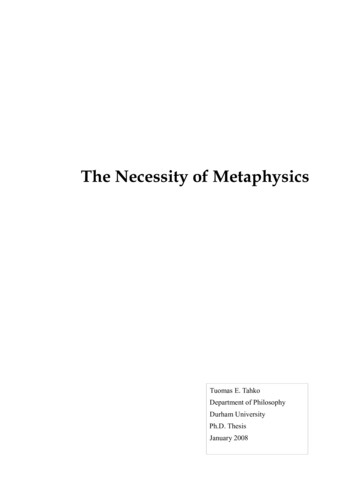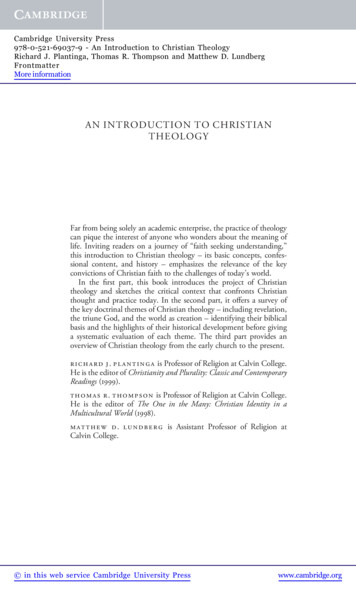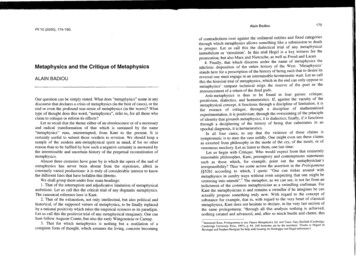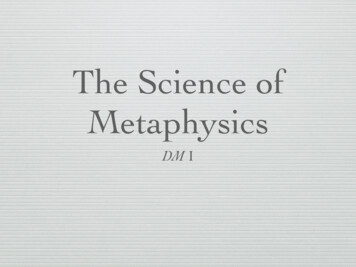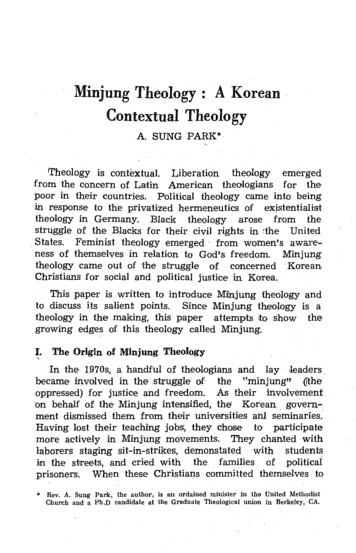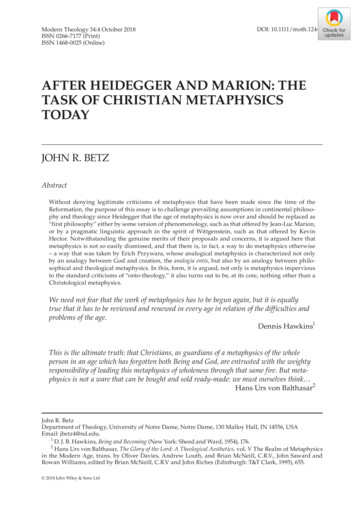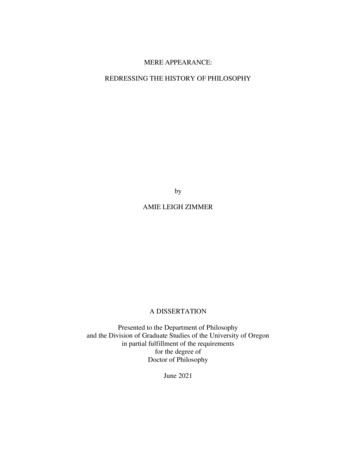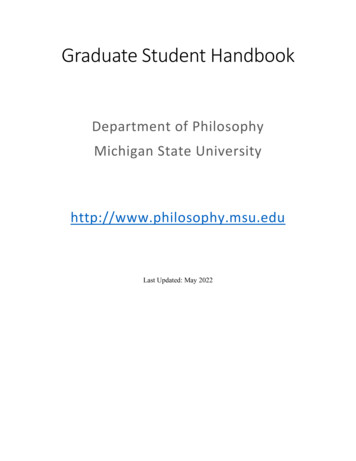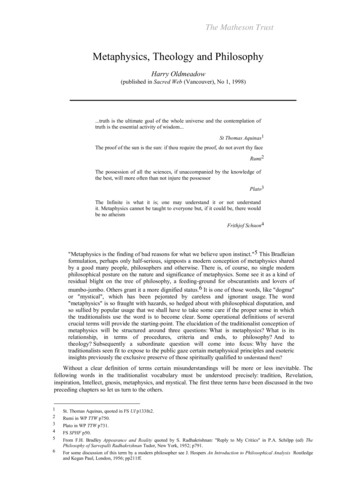
Transcription
The Matheson TrustMetaphysics, Theology and PhilosophyHarry Oldmeadow(published in Sacred Web (Vancouver), No 1, 1998).truth is the ultimate goal of the whole universe and the contemplation oftruth is the essential activity of wisdom.St Thomas Aquinas1The proof of the sun is the sun: if thou require the proof, do not avert thy faceRumi2The possession of all the sciences, if unaccompanied by the knowledge ofthe best, will more often than not injure the possessorPlato3The Infinite is what it is; one may understand it or not understandit. Metaphysics cannot be taught to everyone but, if it could be, there wouldbe no atheismFrithjof Schuon4"Metaphysics is the finding of bad reasons for what we believe upon instinct." 5 This Bradleianformulation, perhaps only half-serious, signposts a modern conception of metaphysics sharedby a good many people, philosophers and otherwise. There is, of course, no single modernphilosophical posture on the nature and significance of metaphysics. Some see it as a kind ofresidual blight on the tree of philosophy, a feeding-ground for obscurantists and lovers ofmumbo-jumbo. Others grant it a more dignified status.6 It is one of those words, like "dogma"or "mystical", which has been pejorated by careless and ignorant usage. The word"metaphysics" is so fraught with hazards, so hedged about with philosophical disputation, andso sullied by popular usage that we shall have to take some care if the proper sense in whichthe traditionalists use the word is to become clear. Some operational definitions of severalcrucial terms will provide the starting-point. The elucidation of the traditionalist conception ofmetaphysics will be structured around three questions: What is metaphysics? What is itsrelationship, in terms of procedures, criteria and ends, to philosophy? And totheology? Subsequently a subordinate question will come into focus: Why have thetraditionalists seen fit to expose to the public gaze certain metaphysical principles and esotericinsights previously the exclusive preserve of those spiritually qualified to understand them?Without a clear definition of terms certain misunderstandings will be more or less inevitable. Thefollowing words in the traditionalist vocabulary must be understood precisely: tradition, Revelation,inspiration, Intellect, gnosis, metaphysics, and mystical. The first three terms have been discussed in the twopreceding chapters so let us turn to the others.1St. Thomas Aquinas, quoted in FS UI p133fn2.2Rumi in WP TTW p750.3Plato in WP TTW p731.4FS SPHF p50.5From F.H. Bradley Appearance and Reality quoted by S. Radhakrishnan: "Reply to My Critics" in P.A. Schilpp (ed) ThePhilosophy of Sarvepalli Radhakrishnan Tudor, New York, 1952; p791.6For some discussion of this term by a modern philosopher see J. Hospers An Introduction to Philosophical Analysis Routledgeand Kegan Paul, London, 1956; pp211ff.
The Matheson TrustIntellect: Whenever the traditionalists use this word or its derivatives it is not to be understood in its modernand popular sense of "mental power". Rather, it is a precise technical term taken from the Latin intellectusand from mediaeval scholasticism: that faculty which perceives the transcendent.7 The Intellect receivesintuitions and apprehends realities of a superphenomenal order. We remember Meister Eckhart'sstatement: "There is something in the soul which is uncreated and uncreatable.this is the Intellect". 8 It is, inSchuon's words, "a receptive faculty and not a productive power: it does not 'create'; it receives andtransmits. It is a mirror."9 The Intellect is an impersonal, unconditioned, receptive faculty, whence theobjectivity of intellection. It is "that which participates in the divine Subject".10 Marco Pallis reminds usthat the belief in this transcendent faculty, capable of a direct contact with Reality, is to be found in alltraditions under various names.11Gnosis: "The word gnosis.refers to supra-rational and thus purely intellective, knowledge of metacosmicrealities."12 It must not be confused with the historical phenomenon of gnosticism, the Graeco-Orientalsyncretism of latter classical times.13 Its Sanskrit equivalent is jñana, knowledge in its fullest sense, whatEckhart calls "divine knowledge".Metaphysic: We shall turn to this term in some detail presently but for the moment the following capsuledefinition from Nasr will suffice: "Metaphysics, which in fact is one and should be named metaphysic. isthe science of the Real, of the origin and end of things, of the Absolute and in its light, therelative".14 Similarly "metaphysical": "concerning universal realities considered objectively".15Mystical: "concerning the same realities considered subjectively, that is, in relation to the contemplativesoul, insofar as they enter into contact with it".16As Guénon observed more than once, metaphysics cannot properly and strictly be defined, for to define is tolimit, while the domain of metaphysics is the Real and thus limitless. Consequently, metaphysics "is trulyand absolutely unlimited and cannot be confined to any formula or any system".17 Its subject, in the wordsof John Tauler, is "that pure knowledge that knows no form or creaturely way". 18 This must always be keptin mind in any attempt at a "definition" which must needs be provisional and incomplete. Let us return tothe passage in which Nasr explains the nature of metaphysics:It is a science as strict and as exact as mathematics and with the same clarity and certitude, but onewhich can only be attained through intellectual intuition and not simply through ratiocination. It thusdiffers from philosophy as it is usually understood. Rather, it is a theoria of reality whose realisationmeans sanctity and spiritual perfection, and therefore can only be achieved within the cadre of arevealed tradition. Metaphysical intuition can occur everywhere - for the "spirit bloweth where it listeth"- but the effective realisation of metaphysical truth and its application to human life can only beachieved within a revealed tradition which gives efficacy to certain symbols and rites upon whichmetaphysics must rely for its realisation.This supreme science of the Real. is the only science that can distinguish between the Absolute and therelative, appearance and reality. Moreover, this science exists, as the esoteric dimension within everyorthodox and integral tradition and is united with a spiritual method derived totally from the tradition inquestion.197See M. Lings What is Sufism? Allen & Unwin, London, 1975; p48.8Quoted in M. Lings A Sufi Saint of the Twentieth Century Uni California Press, Berkeley, 19171; p27.9FS SW p21.10ibid.; p88.11M. Pallis quoted in WP TTW p733.12FS UI p115.13See FS THC pp67-68. See also FS RHC pp10-11.14S.H. Nasr Man and Nature Allen & Unwin, London, 1976; p81.15FS L&T p204fn9.16ibid. Schuon is, of course, not unaware of the linguistic and connotative ambiguites surrounding this term. See FS SPHF p86fn.See also S.H. Nasr Sufi Essays Allen & Unwin, London, 1972; p26 fn5. For an extended traditionalist discussion see W.Stoddart: "Mysticism" in RF UT pp89-95.17R. Guénon: "Oriental Metaphysics" in JN SG pp43-44.18Quoted in C.F. Kelley Meister Eckhart on Divine Knowledge Yale Uni Press, New Haven, 1977; p4.19S.H. Nasr Man and Nature pp81-82. See also Coomaraswamy's undated letter to "M", AKC SL p10: ".traditional Metaphysics isas much a single and invariable science as mathematics."
The Matheson TrustThis view of metaphysics accords with the traditional but not with the modern conception of philosophy- of philo-sophia, love of wisdom as a practical concern. In India, for example, philosophy was never only amatter of epistemology but an all-embracing science of first principles and of the true nature of Reality, andone wedded to the spiritual disciplines provided by religion. The ultimate reality of metaphysics is theSupreme Identity in which all oppositions and dualities are resolved, those of subject and object, knowerand known, being and non-being; thus a Scriptural formulation such as "The things of God knoweth no man,but the Spirit of God".20 As Coomaraswamy remarks, the philosophy, or metaphysics, provided the vision,and religion the way to its effective verification and actualisation in direct experience. 21 The cleavagebetween metaphysics and philosophy only appears in modern times.The nature of metaphysics is more easily grasped through a contrast with philosophy andtheology. However, several general points need to be established before we proceed. Because themetaphysical realm lies "beyond" the phenomenal plane the validity of a metaphysical principle can beneither proved nor disproved by any kind of empirical demonstration, by reference to materialrealities.22 The aim of metaphysics is not to prove anything whatsoever but to make doctrines intelligibleand to demonstrate their consistency.Secondly, metaphysics is concerned with a direct apprehension of reality or, to put it differently, with arecognition of the Absolute and our relationship to it. It thus takes on an imperative character for thosecapable of metaphysical discernment.The requirement for us to recognise the Absolute is itself an absolute one; it concerns man as such andnot man under such and such conditions. It is a fundamental aspect of human dignity, and especially ofthat intelligence which denoted "the state of man hard to obtain", that we accept Truth because it is trueand for no other reason.23Furthermore, because metaphysics is attuned to the sacred and the divine it demands something of thosewho would unlock its mysteries:If metaphysics is a sacred thing, that means it could not be. limited to the framework of the play of themind. It is illogical and dangerous to talk of metaphysics without being preoccupied with the moralconcomitances it requires, the criteria of which are, for man, his behaviour in relation to God and to hisneighbour.24Thirdly, metaphysics assumes man's capacity for absolute and certain knowledge:The capacity for objectivity and for absoluteness is an anticipated and existential refutation of all theideologies of doubt: if man is able to doubt this is because certitude exists; likewise the very notion ofillusion proves that man has access to reality. If doubt conformed to the real, human intelligence wouldbe deprived of its sufficient reason and man would be less than an animal, since the intelligence ofanimals does not experience doubt concerning the reality to which it is proportioned. 25Metaphysics, therefore, is immutable and inexorable, and the "infallible standard by which not onlyreligions, but still more 'philosophies' and 'sciences' must be 'corrected'.and interpreted". 26 Metaphysicscan be ignored or forgotten but not refuted "precisely because it is immutable and not related to change quachange".27 Metaphysical principles are true and valid once and for all and not for this particular age ormentality, and could not, in any sense, "evolve". They can be validated directly in the plenary and unitiveexperience of the mystic. Thus Martin Lings can write of Sufism - and one could say the same of anyintrinsically orthodox traditional esotericism - that it.has the right to be inexorable because it is based on certainties and not on opinions. It has theobligation to be inexorable because mysticism is the sole repository of Truth, in the fullest sense, beingabove all concerned with the Absolute, the Infinite and the Eternal; and "If the salt have lost its savour,201 Corinthians II.11. The Absolute may be called God, the Godhead, nirguna Brahman, the Tao, and so on, according to thevocabulary at hand. See FS LAW pp96-9fn1 for a commentary on the use of "God" and FS L&T for a similar discussion of"Allah".21A.K. Coomaraswamy: "A Lecture on Comparative Religion" quoted in RL CLW p275. Also see "Vedanta and Western Tradition"in AKC SPII p6.22See R. Guénon: op.cit.; p53.23FS ITB p33.24FS SPHF p173.25FS L&T p13. See also FS EPW pp15ff.26Letter to J.H. Muirhead, August 1935, in AKC SL p37.27S. H. Nasr Sufi Essays p86. See also FS SW p42.
The Matheson Trustwherewith shall it be salted?" Without mysticism, Reality would have no voice in the world. Therewould be no record of the true hierarchy, and no witness that it is continually being violated. 28One might easily substitute the word "metaphysics" for "mysticism" in this passage, the former being theformal and objective aspect of the "subjective" experience. However, this is not to lose sight of the fact thatany and every metaphysical doctrine will take it as axiomatic that every formulation is "but error in the faceof the Divine Reality itself; a provisional, indispensable, salutary 'error' which, however, contains andcommunicates the virtuality of the Truth".29 With these considerations to the forefront we can turn to acomparison, firstly, of metaphysics and philosophy.In a discussion of Shankara's Advaita Vedanta Coomaraswamy exposed some of the crucial differencesbetween metaphysics and modern philosophy:The Vedanta is not a "philosophy" in the current sense of the word, but only as the word is used in thephrase Philosophia Perennis. Modern philosophies are closed systems, employing the method ofdialectics, and taking for granted that opposites are mutually exclusive. In modern philosophy things areeither so or not so; in eternal philosophy this depends upon our point of view. Metaphysics is not asystem, but a consistent doctrine; it is not merely concerned with conditioned and quantitativeexperience but with universal possibility.30Modern European philosophy is dialectical, which is to say analytical and rational in its modes. From atraditionalist point of view it might be said that modern philosophy is anchored in a misunderstanding of thenature and role of reason; indeed, the idolatry of reason could hardly have otherwise arisen. Schuonspotlights some of the strengths and deficiencies of the rational mode in these terms:Reason is formal by its nature and formalistic in its operations; it proceeds by "coagulations", byalternatives and by exclusions - or, it can be said, by partial truths. It is not, like pure intellect, formlessand fluid "light"; true, it derives its implacability, or its validity in general, from the intellect, but ittouches on essences only through drawing conclusions, not by direct vision; it is indispensable forverbal formulations but it does not involve immediate knowledge. 31Titus Burckhardt likens reason to "a convex lens which steers the intelligence in a particular direction andonto a limited field".32 Like any other instrument it can be abused. Much European philosophy, adrift fromits religious moorings, has surrendered to a kind of totalitarian rationalism, to what Blake called "SingleVision".33 In so doing it has violated a principle which was respected wherever a metaphysical tradition anda religious framework for the pursuit of wisdom remained intact - the principle of adequation, articulatedthus by Aquinas: "It is a sin against intelligence to want to proceed in an identical manner in typicallydifferent domains - physical, mathematical, metaphysical - of speculative knowledge."34 This, it wouldseem, is precisely what modern philosophers are bent on. No less pertinent in this context is Plotinus's wellknown maxim "knowing demands the organ fitted to the object".35 The grotesqueries of modern philosophyspring, in large measure, from an indifference to this principle. The situation is exacerbated further by thefact that many philosophers have been duped by the claims of a totalitarian scientism and thus suffer from adrastically impoverished view of reality and of the avenues by which it might be apprehended. The words ofthe Moravian alchemist, Michael Sendivogius, seem more apposite than ever: "philosophers are men whomtoo much [profane] learning and thought have made mad".36The place of reason, of logic and dialectic, in metaphysics is altogether more subordinate as thefollowing sample of quotes make clear. It is worth mobilising several quotations as this issue is so oftenmisunderstood, with bizarre results. From Schuon:In the intellectual order logical proof is only a quite provisional crystallisation of intuition, the modes ofwhich. are incalculable. Metaphysical truths are by no means accepted because they are merely28M. Lings What is Sufism? p93.29FS SPHF pp162-163. Cf. A.K. Coomaraswamy: ".and every belief is a heresy if it be regarded as the truth, and not simply as asignpost of the truth." "Sri Ramakrishna and Religious Tolerance" in AKC SPII p38. See also FS SVQ p2.30A.K. Coomaraswamy: "Vedanta and Western Tradition" p6.31FS UI p24. See also FS SW pp18ff.32T. Burckhardt Alchemy Penguin, 1971; p36fn1.33For a discussion of Blake's critique of rationalism see T. Roszak Where the Wasteland Ends Doubleday, New York, 1972;pp142-177.34Quoted in S. H. Nasr Man and Nature p35.35Quoted in E.F. Schumacher A Guide for the Perplexed Jonathan Cape, London, 1977; p49.36per WP TTW p735.
The Matheson Trustlogically clear, but because they are ontologically clear and their logical clarity is only a trace of thisimprinted on the mind.37Or again:Metaphysics is not held to be true - by those who understand it - because it is expressed in a logicalmanner, but it can be expressed in a logical manner because it is true, without - obviously - its truth everbeing compromised by the possible shortcomings of human reason. 38Similarly Guénon:.for metaphysics, the use of rational argument never represents more than a mode of externalexpression and in no way affects metaphysical knowledge itself, for the latter must always be keptessentially distinct from its formulation.39Metaphysical discernment proceeds more through contemplative intelligence than throughratiocination. Metaphysical formulations depend more on symbol and on analogy than on logicaldemonstration, though it is a grave error to suppose that metaphysics has any right to irrationality. 40 Whatmany modern philosophers apparently fail to understand is that thought can become increasingly subtle andcomplex without approaching any nearer to the truth. An idea can be subdivided into a thousandramifications, fenced about with every conceivable qualification and supported with the most intricate andrigorous logic but, for all that, remain purely external and quantitative for "no virtuosity of the potter willtransform clay into gold".41 Furthermore,.that a reasoning might simply be the logical and provisional description of an intellectual evidence,and that its function might be the actualisation of this evidence, in itself supralogical, apparently nevercrosses the minds of pure logicians.42Analytical rationality, no matter how useful a tool, will never, in itself, generatemetaphysical understanding. Metaphysicians of all ages have said nothingdifferent. Shankara, for instance: ".the pure truth of Atman.can be reached bymeditation, contemplation and other spiritual disciplines such as a knower of Brahmanmay prescribe - but never by subtle argument."43 The Promethean arrogance The Prometheanarrogance of much modernist thought, often bred by scientistic ideologies, is revealed in the refusal toacknowledge the boundaries beyond which reason has no competence or utility. This has, of course,prompted some quite ludicrous claims about religion. As Schuon remarks,The equating of the supernatural with the irrational is characterstic it amounts to claiming that theunknown or the incomprehensible is the same as the absurd. The rationalism of a frog living at thebottom of a well is to deny the existence of mountains: this is logic of a kind but it has nothing to do withreality.44The intelligibility of a metaphysical doctrine may depend upon a measure of faith in the traditionalChristian sense of "assent to a credible proposition". As Coomaraswamy observesOne must believe in order to understand and understand in order to believe. These are not successive,however, but simultaneous acts of the mind. In other words, there can be no knowledge of anything towhich the will refuses its consent.45This mode of apprehension is something quite other than the philosophical thought that.believes it can attain to an absolute contact with Reality by means of analyses, syntheses,arrangements, filtrations and polishings - thought that is mundane by the very fact of this ignorance and37FS SPHF p10.38FS EPW p28.39R. Guénon quoted in FS SW p29fn1.40See FS EPW p28.41FS UI p149.42FS L&T p37.43Shankara's Crest Jewel of Discrimination tr & ed. Swami Prabhavananda & C. Isherwood, Mentor, New York, 1970; p73.44FS, L&T, p 37.45A.K. Coomaraswamy: "Vedanta and Western Tradition" p8. See also SHN K&S p6.
The Matheson Trustbecause it is a vicious circle which not merely provides no escape from illusion, but even reinforces itthrough the lure of a progressive knowledge which in fact is inexistent. 46It is in this context that we can speak of modern philosophy as "the codification of an acquired infirmity". 47Unlike modern philosophy, metaphysics has nothing to do with personal opinion, originality or creativity quite the contrary. It is directed towards those realities which lie outside mental perimeters and which areunchanging. The most a metaphysician will ever want to do is to reformulate some timeless truth so that itbecomes more intelligible in the prevailing climate.48 A profane system of thought, on the other hand, isnever more than a portrait of the person who creates it, an "involuntary memoir" as Nietzsche put it. 49The metaphysician does not seek to invent or discover or prove a new system of thought but rather tocrystallize direct apprehensions of Reality insofar as this is possible within the limited resources of humanlanguage, making use not only of logic but of symbol and analogy. Furthermore, the science of metaphysicsmust always proceed in the context of a revealed religion, protected by the tradition in question which alsosupplies the necessary supports for the full realisation or actualisation of metaphysical doctrines. Themetaphysician seeks not only to formulate immutable principles and doctrines but to live by them, toconform his or her being to the truths they convey. In other words, there is nothing of the "art for art's sake"type of thinking about the pursuit of metaphysics: it engages the whole person or it is as nothing.50 AsSchuon states,The moral exigency of metaphysical discernment means that virtue is part of wisdom; a wisdom withoutvirtue is in fact imposture and hypocrisy. plenary knowledge of Divine Reality presupposes ordemands moral conformity to this Reality, as the eye necessarily conforms to light; since the object to beknown is the sovereign Good, the knowing subject must correspond to it analogically. 51A point often overlooked: metaphysics does not of necessity find its expression only in verbalforms. Metaphysics can be expressed visually and ritually as well as verbally. The Chinese and Red Indiantraditions furnish pre-eminent examples of these possibilities. Moreover,.the criterion of metaphysical truth or of its depth lies not in the complexity or difficulty of itsexpression, having regard to a particular capacity of understanding or style of thinking. Wisdom doesnot lie in any complication of words but in the profundity of the intention; assuredly the expression mayaccording to the circumstances be subtle and difficult, or equally it may not be so. 52One is irresistibly reminded of the Buddha's Flower Sermon.By way of a digression it might be noted that because the fundamental distinction between reason andIntellect has been obscured in recent European thought, then similarly, ".the basic distinction betweenmetaphysics as a scienta sacra or Divine Knowledge and philosophy as a purely human form of mentalactivity has been blurred or forgotten." 53 In the field of comparative religion this has led to a good deal ofconfusion. As S.H. Nasr has noted, to speak of Hindu or Chinese philosophy and rationalistic Europeanphilosophy in the same breath is a contradiction in terms unless the word "philosophy" is used in two quitedifferent senses. A failure to draw the necessary distinctions has.made a sham of many studies of comparative philosophy and has helped to reduce to nil the realsignificance of Oriental metaphysics. To say that this or that statement of Hegel resembles theUpanisads or that Hume presents ideas similar to Nagarjuna's is to fall into the worst form of error, onewhich prevents any type of profound understanding from being achieved, either for Westerners wantingto understand the East or vice versa.54Let us summarise the most significant differences between metaphysics and modern philosophy. Thelatter is, generally speaking, analytical, rationalistic and quantitative; it is concerned with relationships and46FS L&T p34.47FS TM p4.48Here we are at the opposite end of the spectrum not only from the philosophical relativists but from those who hold a"personalist" or "existentialist" view of truth.49Friedrich Nietzsche in Beyond Good and Evil, taken from A Nietzsche Reader Penguin 1977, ed R.J. Hollingdale; Extract 13.See also FS L&T p34 and FS TM p4. (For an iulluminating passage on both the grandeur and the "dementia" of Nietzsche's worksee FS THC p15.)50See A.K. Coomaraswamy: "Vedanta and Western Tradition" p9.51FS RHC p86.52FS UI p111.53S.H. Nasr: "Conditions for a meaningful comparative philosophy" Philosophy East and West XXII, i, 1972; p54.54ibid.; p55 and p58.
The Matheson Trustcontingencies accessible to rational inquiry, or at least to the workings of the normal mind, these includingimagination which is no less a mental process than ratiocination; European philosophers tend to see thedevelopment of philosophy as progressive, driven forward by the work of this or that philosopher whocreates or discovers new insights, fresh perceptions, a different vocabulary of discourse, and so on;philosophy is usually seen as self-validating, not requiring any justification outside itself. Metaphysics, bycontrast, is concerned with supra-mundane, transcendent and unconditioned realities; it is qualitative,symbolical and synthetic in its modes and is rooted in certain immutable principles; it is indifferent to thequestion of "proofs" and the metaphysician's purpose is not the resolution of some "problem" but thedemonstration of something already intellectually evident; it does not evolve or progress; it is intimatelylinked with spiritual disciplines and depends for its realisation on the presence of elements which could onlybe drawn from an integral tradition; it is a practical pursuit which has as its end gnosis, transformation andsanctification.The relationship between metaphysics and theology is more subtle, complex and problematic. Under thetraditionalist view, a Divine Revelation is always the fountainhead of any orthodox religion whilemetaphysical insight derives from intellection. The dichotomy here is more apparent than real, Revelationtaking the place of intellection for the human collectivity in question. This is a principle not easily graspedbut without it the apparent antagonisms of theology and metaphysics cannot be resolved. Schuon defines therelationship between Revelation and intellection in this way:.in normal times we learn a priori of divine things through Revelation, which provides for us thesymbols and the indispensable data, and we have access a posteriori to the truth of these things throughIntellection, which reveals to us their essence beyond received formulations, but not opposing them.Revelation is an Intellection in the Macrocosm, while Intellection is a Revelation in the microcosm; theAvatara is the outward Intellect, and the Intellect is the inward Avatara.55It might be said, then, that intellection appears in a more "subjective" mode, but only with this qualification:It is subjective because empirically it is within us. The tern "subjective", as applied to the intellect, is asimproper as the epithet "human"; in both cases the terms are used simply in order to define the way ofapproach.56The traditionalists, always alert to the dangers of a reductionist psychologism, insist that the truth to whichintellection gives access is beyond all spatio-temporal determinations. As Schuon points out, Biblicalformulations such as "the Kingdom of Heaven is within you" certainly do not mean that heaven, God orTruth are of a psychological order but simply that access to these realities is to be found through the centreof our being.57Religion itself, flowing from the Divine, must contain within itself principial or metaphysical knowledgebut this will be veiled by the forms in question. For instance,The message of Christ, like that of the Bible, is not a priori a teaching of metaphysical science; it isabove all a message of salvation, but one that necessarily contains, in an indirect way and under cover ofan appropriate symbolism, metaphysics in its entirety.58The metaphysical emphasis varies from one tradition to another. Buddhism, for example, is primarily aspiritual therapy rather than a metaphysical system but one which of necessity requires a metaphysics whileHinduism is, in the first place, a metaphysics which implies, under the same necessity, a spiritualtherapy.59 Doubtless there are those who will be quick to asseverate that Buddhism is indifferent tometaphysics, pointing to the Buddha's refusal to answer the indeterminate questions. The traditionalistswould simply remind us of Nagarjuna's statement that the Buddha taught two levels of truth and that anunderstanding of the distinction, not possible without a metaphysical doctrine, is preconditional to a fullunderstanding of the dharma.60 "There is no science of the soul," says Schuon, "without a metaphysicalbasis to it and without spiritual remedies at its disposal." 6155FS EPW p10. See also SHN K&S pp148-149.56FS UI p57fn2.57F. Schu
"Metaphysics is the finding of bad reasons for what we believe upon instinct." 5 This Bradleian formulation, perhaps only half-serious, signposts a modern conception of metaphysics shared by a good many people, philosophers and otherwise. There is, of course, no single modern philosophical posture on the nature and significance of metaphysics.
